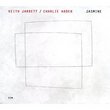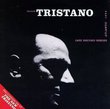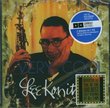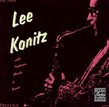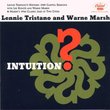| All Artists: Lee Konitz, Warne Marsh Title: Lee Konitz With Warne Marsh Members Wishing: 2 Total Copies: 0 Label: Koch Records Original Release Date: 1/1/1994 Re-Release Date: 6/22/1999 Album Type: Original recording reissued Genres: Jazz, Pop Styles: Cool Jazz, Modern Postbebop, Bebop Number of Discs: 1 SwapaCD Credits: 1 UPC: 099923850229 |
Search - Lee Konitz, Warne Marsh :: Lee Konitz With Warne Marsh
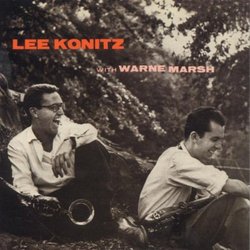 | Lee Konitz, Warne Marsh Lee Konitz With Warne Marsh Genres: Jazz, Pop
There aren't a whole lot of occasions to hear Lee Konitz's '50s-era telltale alto saxophone. So this 1956 date, which couples Konitz with Warne Marsh on tenor sax, is a great window on the Lennie Tristano school of improvi... more » |
Larger Image |
CD DetailsSynopsis
Amazon.com There aren't a whole lot of occasions to hear Lee Konitz's '50s-era telltale alto saxophone. So this 1956 date, which couples Konitz with Warne Marsh on tenor sax, is a great window on the Lennie Tristano school of improvisation. The melodies are all cushioned by blurred tones and bending shapes, and Marsh and Konitz's unison playing is jointly silken. They amaze with their very un-Basie-like read of "Topsy" and their equally un-Bird-like read of "Donna Lee," typically a vehicle for pyrotechnics. This stuff was assailed by some in the 1950s and '60s for its seemingly cerebral abstractions and avoidance of emotional intensity. And it still sounds "cool" by comparison to the "hot" sounds of bebop, but Konitz and Marsh exercise a kind of calmed creativity that seems to avoid the emotion-intellect question altogether, dropping the listener into a low-key but by no means low-intensity display of excellence. --Andrew Bartlett Similar CDs
|
CD ReviewsA classic from Atlantic's vaults N. Dorward | Toronto, ON Canada | 07/24/2001 (5 out of 5 stars) "Looking back, it's a little hard to grasp why the music of the Tristano school was considered "difficult" or "unemotional". Marsh did, of course, make a famous & still pertinent distinction between emotion and _emoting_ (considering the latter a selfindulgence to be avoided). It was Wayne Shorter who reintroduced a Lestorian cool back into 1960s jazz, & fans of that mode of jazz might do well to turn back to the work of Marsh & Konitz from the 1950s.This album is one of a number of Tristanoite discs recorded by Atlantic in the 1950s--crucial documentation given that so few studio recordings exist by Tristano, Marsh & Konitz from this period. (Fans of cool-school jazz get used to dealing with grimly-recorded live dates released on specialist labels.) This is one of the best; besides Konitz's alto & Marsh's tenor, it features the pianist Sal Mosca (replaced on one track by Ronnie Ball), the guitarist Billy Bauer, Oscar Pettiford on bass and Kenny Clarke on drums.One thing the disc suggests is how scary it must have been to play with Warne Marsh (there's one story that at a jam session even Stan Getz was intimidated by Marsh's playing!). Even Konitz at a few points seems to be startled by what the tenorman is doing. Marsh could play with tremendous speed & rhythmic subtlety, packing in ideas without pause or filler, & play rings around others--he actually plays _higher_ than Konitz at many points here. His tone is sui generis--veiled & oblique--& his grasp of harmonic possibilities puts most boppers to shame. -- Konitz's playing here isn't nearly as involuted as Marsh's, but just as creative: his famously "pure" alto tone is nonetheless as arresting as any more conventionally blues-based approach, & especially its near-cry in the high register.The classic tracks here are "Two Not One" & "Background Music", the apotheosis of the extremely complex heads favoured by Tristano & his students. The latter is a Marsh line based on "All of Me"; the former sounds like it's based on "I Can't Believe That You're in Love with Me". There's also, among other things, a fine blues, "Don't Squawk", & the marvelous "Donna Lee", in which at the return of the head the already difficult line is played with extra rhythmic displacements that compound the difficulty: a real tour de force. "Ronnie's Line" is played using a characteristic Tristano device of omitting to state the head until the very end; it's also a good opportunity to hear the underrated pianist Ronnie Ball (his solo disc on Savoy, now out of print, should be snapped up if you see it). Ball's got a blunter, more good-humoured approach than Mosca, whose playing I'm not greatly enamoured of.A fine album. Konitz's real masterpieces come a little further on, perhaps, notably with _Motion_ on Verve and the Half Note sessions, but this is still an excellent disc." A must for all collections! Buddy Dearent | Lawrence, MA. | 11/23/1999 (5 out of 5 stars) "Two of Lennie Tristano's prime students at their very best circa 1956. One of their best outings since the now famous Lennie Tristano Capital Records date. Interesting lines built on standard chord progressions. Every track is at the highest level of improvisation in the hands of these masters of the cool school. Cool; yet all solo's have an underlying intensity seldom to be found in the players of this idiom." Essential. Shawn | IL United States | 09/30/2005 (5 out of 5 stars) "You hear a lot about the "Tristano" school, Lee Konitz, and "cool jazz."
The recordings by Lee Konitz, Warne Marsh, Lennie Tristano (and their co-conspirators like Sal Mosca, Billy Bauer) are just wonderful music. These are players who had a deep understanding of Charlie Parker. But, they also were well versed in the vocabulary of Louis Armstrong and Lester Young. They didn't just rehash what they learned from Parker. Like Rollins and Coltrane, they also took the next step. This is what makes these recordings so special; it's not just a reaction to the music of the be-boppers. It's really a culmination of where jazz had been, and where it would go in the future. There's a lot of group improvisation here, at times it's almost like chamber music. The influence of Armstrong and New Orleans jazz is evident, and their music displays a collaborative spirit which musicians like Bill Evans, Ornette Coleman, Stan Getz/Bob Brookmeyer, and the Miles Davis Quintet of the mid-sixties would further explore. " |

 Track Listings (8) - Disc #1
Track Listings (8) - Disc #1